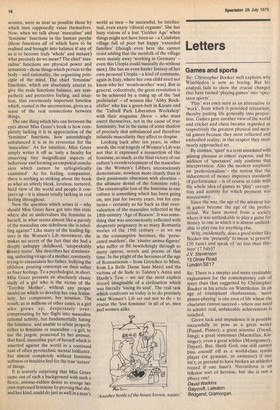Games and sports
Sir: Christopher Booker well explains why Wimbledon is now so boring. But his analysis fails to show the crucial changes that have turned 'playing games' into 'spectator sports'.
'Play' was once seen as an alternative to 'work', from which it provided relaxation, thereby putting life generally into proportion. Games gave another view of the world and cricket and chess became regarded as respectively the greatest physical and mental games because they most reflected and embodied reality; in this respect they most nearly approached art.
By contrast, 'sport' is a term associated with gaining pleasure at others' expense, and the addition of 'spectators' only confirms that interpretation. Also the modern emphasis on 'professionalism'— the notion that the inducement of money improves standards of performance — is of course at odds with the whole idea of games as 'play': occupation and activity for which payment was unnecessary.
Since the war, the age of the amateur has in games become the age of the professional. We have moved from a society where it was unthinkable to play a game for money to one in which it is almost unthinkable to play one for anything else.
Why, incidentally, does a good writer like Booker use 'presently' to mean 'at present' (30 June) and speak of `no less than thirteen' (7 July)?
J. V. Stevenson 15 Olney Road London SE17






































 Previous page
Previous page